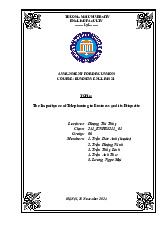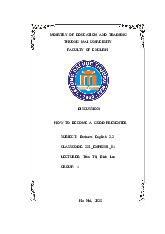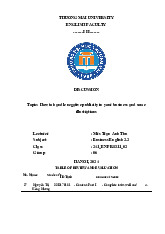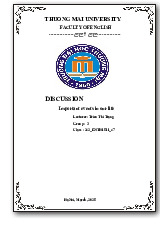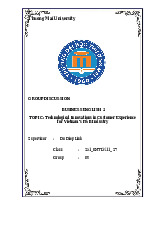















Preview text:
21:42 21/1/25 Văn hoá Anh-chapter 4-9 Chapter 4: Attitude 1. Overview of Attitudes
British attitudes are characterized by a blend of tradition, individuality, and modernity.
While there is a strong perception that Britain is a "land of tradition," in reality, many
people may not adhere to traditional practices in their everyday lives. This disconnect
highlights a dynamic cultural landscape influenced by various factors, including
historical changes, multiculturalism, and evolving social norms
2. Stereotypes and Changes
- Stereotypes: There is a popular belief that the British adhere strictly to traditional
customs. Examples include ceremonies such as the State Opening of Parliament and
the Changing of the Guard. However, these rituals often contrast with everyday
practices, where fewer individuals follow ancient customs or participate in local traditions.
- Changing Habits: Traditional British customs, like the full English breakfast or
tea-drinking, have declined in popularity. The modern British diet is more diverse,
reflecting influences from various cultures due to immigration and globalization. 3. Multiculturalism
- Diversity: The UK has become a multicultural society, particularly in urban areas,
due to significant immigration in the 20th century. "New British" communities bring
various attitudes and cultural practices that contribute to the British identity while also
creating a divergence from indigenous attitudes.
- Integration: Despite initial differences, there is a trend towards narrowing these
divergences as new British communities integrate into the broader societal framework.
4. Conservatism and Individualism
- Conservatism: There is a prevailing sentiment that values tradition and stability. This
is reflected in attitudes toward heritage, architecture, and even in political rhetoric that
emphasizes "traditional family values."
- Individualism: British society exhibits individualistic traits, leading to a lack of
collective customs. This individualism can be seen in daily behaviors, where
traditional norms may be set aside in favor of personal preferences
5. Love of Nature and Animals
- Nature: There is a strong appreciation for the countryside, often idealized as a place
of peace and beauty. Gardening is a popular pastime, highlighting the British connection to nature..
- Animals: The British have a sentimental attitude towards animals, with a significant
percentage of households owning pets. This reflects a broader cultural emphasis on
compassion for wildlife and domestic animals alike. about:blank 1/16 21:42 21/1/25 Văn hoá Anh-chapter 4-9
6. Formality and Informality
- Public vs. Private: The British are often more reserved in public but tend to be
informal in private settings. This duality is evident in their attitudes towards dress and social interactions. 7. Privacy and Sex
- Privacy: There is a strong respect for privacy in British culture, particularly
regarding personal matters. While there is a more open attitude towards sex than in
previous generations, it is still considered a private matter. Conclusion
British attitudes are complex and continuously evolving. While traditions hold a
significant place in the national consciousness, everyday behaviors reflect a blend of
conservatism, individualism, and multicultural influences. The interplay between
tradition and modernity shapes the British identity, creating a rich tapestry of cultural
attitudes that define contemporary society. Chapter 5: Political life
9. Democracy (give definition, expression in the UK and reasons? )
a) Definition of Democracy : Democracy is a form of political organization of
society based on the recognition of the people as the source of power and the
recognition of the principles of equality, freedom, and human rights.
b) Expression in the UK and reasons:
Although British people may not have much respect for the present institutions
of the law, they have a high respect for the law . There is little systematic law-breaking
by large sections of the population.
For example, tax evasion is not the national pastime that it is said to be in some countries.
However, the British are comparatively unenthusiastic about making new law .
The general feeling is that, while you have to have laws sometimes, wherever possible
it is best to do without them. In many aspects of life, the country has comparatively few rules and regulations.
There are two unique aspects of British life :
- Britain is one of the very few European countries whose citizens do not have identity cards.
- Britain does not have a Freedom of Information Act.
In Britain, Democracy involves less participation by ordinary citizens in
governing and lawmaking than it does in many other countries. There is no concept of about:blank 2/16 21:42 21/1/25 Văn hoá Anh-chapter 4-9
these things being done “by the people”. If the government wants an important change
in the way that the country is run - it does not have to ask the people.
In Britain, Democracy has never meant that the people have a hand in running
the country; rather it means that the people choose who is to govern the country, and
then let them get on with it.
10. Party system (give description and advantages & disadvantages) 10. Party System in the UK Description
The UK operates a two-party system, primarily dominated by the Conservative Party
and the Labour Party. This system has evolved over time, with political parties
originally forming within Parliament before extending to the public. Neither party
exclusively serves the interests of a single group, and both have a broad base of
support across different demographics. Advantages
- Stability: The two-party system often leads to stable governments, as one party
typically gains a majority in the House of Commons, reducing the likelihood of
coalition governments that can be fragile.
- Clear Choices: Voters have a straightforward choice between two main parties,
making the electoral process simpler and more accessible.
- Accountability: With fewer parties, it is easier for voters to hold the governing party
accountable for its policies and actions. Disadvantages
- Limited Representation: Smaller parties may struggle to gain representation, leading
to a lack of diversity in political viewpoints and policies.
- Voter Disenfranchisement: Voters who support smaller parties may feel their votes
are wasted, leading to lower voter turnout and engagement.
- Polarization: The focus on two dominant parties can lead to a polarized political
landscape, where compromise and cooperation are challenging.
11. Public Attitudes to Politics Situation
Public attitudes towards politics in the UK are characterized by a general distrust of
politicians and political institutions. Many citizens express a lack of faith in the
integrity of their elected representatives, leading to widespread skepticism about
political motives and actions. Surveys indicate that a significant portion of the about:blank 3/16 21:42 21/1/25 Văn hoá Anh-chapter 4-9
population is unaware of key political figures, such as local MPs or government ministers. Reasons
- Perceived Dishonesty: Politicians are often viewed as untrustworthy, with a history
of scandals and misleading statements contributing to public cynicism.
- Lack of Engagement: Many citizens feel disconnected from the political process,
leading to a lack of knowledge about political matters and candidates.
- Cultural Norms: There is a traditional British maxim that advises against discussing
politics and religion in polite conversation, reinforcing the notion that political
discussions are contentious and should be avoided.
- Voter Turnout: Despite these negative attitudes, there is still a relatively high turnout
for national elections (around 75% of the adult population), indicating that while
people may be critical of politics, they still recognize the importance of participating in elections.
These attitudes reflect a complex relationship with the political system, where
individuals may feel disillusioned yet understand the necessity of civic engagement. Chapter 6: The mornachy
12. British monarchy (role, value, future) Role :
● The British monarchy serves as the ceremonial head of state, embodying the
continuity and tradition of the nation. The monarch performs various
ceremonial duties, such as the State Opening of Parliament and representing the
UK at official events and diplomatic functions.
● The monarchy also plays a constitutional role, with powers that are largely
ceremonial and exercised on the advice of the government. While the monarch
has formal powers, in practice, these are limited by constitutional conventions
and parliamentary sovereignty. Value :
● The monarchy is seen as a symbol of national unity and stability, providing a
sense of identity and continuity in British society. Many citizens view the royal
family as an essential aspect of the UK's cultural heritage.
● The monarchy also has economic value, attracting tourism and international
interest, particularly during royal events and ceremonies. Future : about:blank 4/16 21:42 21/1/25 Văn hoá Anh-chapter 4-9
● The future of the monarchy may be influenced by changing public attitudes,
especially among younger generations who may have different views on its relevance.
● There have been debates about the monarchy's costs and its role in a modern
democracy, but it continues to maintain a significant level of public support.
The monarchy may evolve to become more accessible and relatable,
particularly following the example set by younger royals who engage with contemporary issues
13. Comparison of theory and practice of British monarchy (in tabulate form - recommended) Chapter 7: The government
14. General information about British government
The UK operates as a parliamentary democracy , where the government is elected by
the people and accountable to Parliament.
The government consists of three main branches: executive, legislative , and judicial .
● Executive : Led by the Prime Minister, who is the head of government and is
supported by the Cabinet, made up of senior ministers. about:blank 5/16 21:42 21/1/25 Văn hoá Anh-chapter 4-9
● Legislative : Composed of the House of Commons (elected members) and the
House of Lords (appointed and hereditary members), which debate and pass laws.
● Judicial : An independent judiciary that interprets and applies the law, ensuring justice and the rule of law.
The government is responsible for creating and implementing policies, and it must
maintain the confidence of the House of Commons to remain in power
15. Roles of the Prime Minister (give reasons)
Head of Government : The Prime Minister leads the executive branch, making key
decisions regarding government policy and direction. This role is essential for
establishing the overall governance strategy and addressing national issues.
Leader of the Cabinet : The Prime Minister chairs Cabinet meetings and coordinates
the activities of government ministers. This ensures effective communication and
collaboration among different government departments, which is crucial for coherent policy-making.
Parliamentary Leader : The Prime Minister represents the government in the House
of Commons and is responsible for defending government policies and decisions. This
role is vital for maintaining the confidence of MPs and ensuring that the government can pass legislation.
Public Representative : The Prime Minister represents the UK at international levels
and engages in diplomacy with other nations. This is important for building alliances
and promoting national interests globally.
Crisis Manager : During emergencies or national crises, the Prime Minister plays a
key role in leading the response and communicating with the public. This is essential
for maintaining public confidence and ensuring effective management of crises
Chapter 8: Parliament: Nghị viện
- Features of British Parliament (function, structure) ● Function:
+ Making new law: tạo luật mới
+ Give authority for the government to raise and spend money: cấp phép
cho việc thu và chi tiền (Chính phủ không thể tự ý thu thuế hoặc chi tiêu
mà không có sự đồng ý từ Nghị viện. Điều này đảm bảo rằng tiền của
người dân được sử dụng đúng cách và có sự kiểm soát.) about:blank 6/16 21:42 21/1/25 Văn hoá Anh-chapter 4-9
+ Keep a close eye on government activities and discuss them: Giám sát
hoạt động của chính phủ (bao gồm việc chất vấn và thảo luận các kế
hoạch, chính sách của chính phủ) ● Structure: + Two houses:
The House of Lords : the feudal aristocracy and the leaders of the Church Lords: known as “peers”
❖ Not elected but as of right
❖ Being inherited aristocratic title (Được thừa kế danh hiệu quý tộc:
Danh hiệu của họ là do dòng dõi quý tộc truyền lại qua nhiều thế hệ.)
❖ A relic of early, undemocratic times (Là di sản của thời kỳ thiếu dân
chủ trước đây: Tầng lớp này tồn tại từ thời kỳ trước khi nền dân chủ
được hình thành, và đại diện cho một tàn dư của thời kỳ đó.)
• Have little power, losing power and altering composition in process
• All proposals need improvement from this House (but possibility of refusing is limited)
( Viện quý tộc/thượng viện : Viện này bao gồm những người thuộc giới quý
tộc, như các công tước, bá tước và các lãnh đạo của Nhà thờ Anh. Họ
không được bầu mà chủ yếu là do thừa kế tước vị hoặc được bổ nhiệm
Viện Quý tộc có vai trò trong việc xem xét và thảo luận các dự luật được
gửi lên từ Viện Thứ dân. Họ có thể gợi ý thay đổi, nhưng không thể chặn
hoàn toàn một dự luật.)
The House of Commons : representatives from the towns and the less
important landowners in rural areas ⇒ more important
( Viện thứ dân: Đây là nơi các đại diện của người dân được bầu cử vào
thông qua các cuộc bầu cử. Các thành viên của Viện Thứ dân đại diện cho
các khu vực; Viện Thứ dân có quyền lực hơn Viện Quý tộc và quyết định
về các luật lệ quan trọng. Khi chính phủ muốn thông qua một luật mới
hoặc ngân sách, họ cần sự đồng ý của Viện Thứ dân.) about:blank 7/16 21:42 21/1/25 Văn hoá Anh-chapter 4-9
***Seating arrangement: The seating arrangement in Parliament encourages
confrontation between the government and the opposition.
***Debating chamber: There are no desks for MPs, creating an informal
atmosphere and encouraging cooperation in debates. *** The design: Deliberate
• In medieval time: the commons met in a church with rows of benches facing
with each other (lịch sử họp trong nhà thờ)
• Accident: the House was badly damaged by bomb (1941)
• Deliberately rebuilt to old pattern because of a belief in the two-way “for” &
“against” tradition (các nhà thiết kế đã cố ý phục hồi lại kiểu dáng cũ, vì họ tin
rằng việc có hai bên "ủng hộ" và "phản đối" là rất quan trọng) *** The meeting rules: Ancient habit preserved:
- Forbid MPs to address one another directly or use personal names → “the
honorable Member for Winchester”; “my right honorable friend”
( Cấm các nghị sĩ gọi nhau một cách trực tiếp hoặc sử dụng tên cá nhân ) - Never say “you”
- All remarks & questions must go “through the chair”
(Tất cả các phát biểu và câu hỏi phải qua “chủ tọa)
• Reason: (giảm bớt căng thẳng trong tranh luận và khả năng bạo lực)
– Take “the heat” out of debate
– Decrease possibility of violence
- Component of the British Parliament (houses, functions, reasons for existence) House of Commons:
Function: Represents the people and passes laws. about:blank 8/16 21:42 21/1/25 Văn hoá Anh-chapter 4-9
Reason for Existence: Ensures that the will of the people is reflected in government decision-making. House of Lords:
Function: Reviews and revises bills passed by the House of Commons, though
its power to reject is limited.
Reason for Existence: A remnant of undemocratic times, it represents the
aristocracy and offers long-term scrutiny of legislation (Là tàn dư của thời kỳ
phi dân chủ, nó đại diện cho tầng lớp quý tộc và đưa ra sự giám sát lâu dài về luật pháp) *** Quy trình:
Quy trình nghị viện bao gồm việc thảo luận và bỏ phiếu về các đề xuất, cùng
với sự hỗ trợ quan trọng từ các ủy ban trong việc xem xét và điều tra các hoạt
động liên quan đến chính phủ và luật pháp. *** The party system:
Most division take place along party line
• MPs: vote the way told by their party
• Each of 2 major parties has the whips: people who make sure the vote of its MPs
• Traditionally: ➢If government loses the vote on important matter → have to
resign ➢If a division: MPs go to the House to vote (if not present during debate) Từ vựng:
MPs: nghị sĩ; constituents: cử tri; nghị sĩ là những người được bầu bởi cử tri (công dân)
Division: cuộc bỏ phiếu Chapter 9: Elections about:blank 9/16 21:42 21/1/25 Văn hoá Anh-chapter 4-9
- General information about British election system (procedures, conditions, campaign) 1. Election Procedures
First-past-the-post system: In this system, each constituency elects one
representative (Member of Parliament - MP). Voters go to polling stations and
choose one candidate on the ballot. The candidate with the most votes in each constituency wins the seat.
Rule: If a voter selects more than one candidate, the ballot is considered invalid.
Election for the House of Commons: Each constituency elects an MP to
represent it in the House of Commons, and general elections typically occur every five years.
2. Conditions for Participation
Eligibility to vote: Citizens aged 18 and over are allowed to vote.
Election frequency: General elections are held at least once every five years, but
the government has the flexibility to decide the exact election date within that period. 3. Election Campaign
Canvassing: Campaigners go door-to-door to ask voters about their intentions.
This helps political parties estimate their support on election day.
Campaign style: While elections are relatively quiet in the UK, media coverage
plays an essential role in informing the public. Voters often choose candidates
based on the political party they represent. 4. Polling Day
Timing: Elections are typically held on a Thursday, with people going about
their normal workday. Polling stations are open for voters to cast their ballots.
Vote counting: After polling stations close, the votes are counted immediately. 5. Election Night about:blank 10/16 21:42 21/1/25 Văn hoá Anh-chapter 4-9
Results announcement: The vote counting begins as soon as polling stations
close. By around 2 a.m., half of the constituencies will have declared results.
Some constituencies might not announce results until Friday afternoon.
Returning Officer: The official responsible for announcing the total votes for each candidate Conclusion:
The British election system follows the first-past-the-post method, where
elections are held every five years, with multiple political parties participating.
Polling typically occurs on a Thursday, and results are announced during the night or early the next day.
( 1. Quy trình bầu cử (Procedures)
● Hệ thống "First-past-the-post" : Hệ thống này chọn ra một đại diện duy nhất
cho mỗi khu vực bầu cử. Cử tri đi đến điểm bỏ phiếu và chọn một ứng
viên trên lá phiếu. Ứng viên nào nhận được nhiều phiếu nhất trong khu
vực sẽ thắng và trở thành Thành viên Nghị viện (MP).
● Lưu ý : Nếu cử tri chọn hơn một ứng viên, lá phiếu sẽ bị coi là không hợp lệ.
● Bầu cử cho Hạ viện : Mỗi khu vực sẽ chọn ra một MP để đại diện cho
khu vực đó trong Hạ viện (House of Commons). Các cuộc bầu cử thường diễn ra mỗi 5 năm.
2. Điều kiện tham gia (Conditions)
● Quyền bỏ phiếu : Người dân từ 18 tuổi trở lên mới đủ điều kiện bỏ phiếu
trong các cuộc bầu cử.
● Tần suất bầu cử : Cuộc tổng tuyển cử được tổ chức ít nhất mỗi 5 năm
một lần, nhưng chính phủ có thể chọn ngày cụ thể để tổ chức bầu cử.
3. Chiến dịch bầu cử (Campaign)
● Canvassing : Những người vận động tranh cử đi từng nhà hỏi ý kiến cử tri
về dự định bỏ phiếu của họ. Điều này giúp các đảng phái chính trị ước
lượng sự ủng hộ trong ngày bầu cử.
● Chiến dịch bầu cử : Mặc dù bầu cử ở Anh thường yên tĩnh, các phương
tiện truyền thông đóng vai trò quan trọng trong việc đưa tin. Cử tri
thường lựa chọn ứng viên dựa trên đảng phái mà ứng viên đó đại diện. about:blank 11/16 21:42 21/1/25 Văn hoá Anh-chapter 4-9
4. Ngày bầu cử (Polling Day)
● Thời gian : Ngày bầu cử thường được tổ chức vào thứ Năm , và trong ngày
này, mọi người vẫn đi làm bình thường. Các điểm bỏ phiếu sẽ mở cửa để
người dân đến bỏ phiếu.
● Quy trình kiểm phiếu : Sau khi đóng cửa, các thùng phiếu được mở và
kiểm phiếu bắt đầu ngay sau đó.
5. Đêm bầu cử (Election Night)
● Thời gian công bố kết quả : Việc kiểm phiếu bắt đầu ngay sau khi các điểm bỏ
phiếu đóng cửa. Đến 2 giờ sáng , ít nhất một nửa số khu vực bầu cử sẽ có
kết quả, và một số khu vực có thể kéo dài đến chiều hôm sau (thứ Sáu).
● Công bố kết quả : Quan chức trả lại phiếu bầu (Returning Officer) sẽ
công bố số phiếu bầu cho từng ứng viên)
NHẬN XÉT VỀ HỆ THỐNG BẦU CỬ
The UK election system has several key characteristics:
1. First-past-the-post system:
- This is a straightforward election system where each constituency elects one
representative (MP) for the **House of Commons**. The candidate with the
most votes wins, regardless of the percentage of total votes received.
- The strength of this system lies in its ability to produce quick and easily
understood election results, helping to ensure government stability. However, it
can lead to imbalances, making it difficult for smaller parties to gain seats. 2. Election process:
- Elections are held every five years, and voters aged 18 and over are eligible
to vote. Election day is typically on a Thursday.
- The election process is orderly and calm, with a strong emphasis on media-driven campaigning.
3. Transparency and fairness: about:blank 12/16 21:42 21/1/25 Văn hoá Anh-chapter 4-9
- The counting of votes takes place immediately after polling stations close,
with results announced on the same night or the following morning. This helps
ensure transparency and trust in the electoral system. 4. Limitations:
- The system is sometimes criticized for not fully reflecting the voters' will, as
a candidate can win with a plurality of votes, and smaller parties struggle to secure seats.
Overall, the UK's election system is highly regarded for its stability and
efficiency, although there are ongoing debates about its fairness towards smaller parties.
Chapter 10: International relations
- British relationships with nations in the UK (give brief description and reasons for the development)
- British relationship with other parts of the world (describe the important
partner and reasons for emphasis)
1. British Relationships with Nations in the UK
The United Kingdom is composed of four nations: England, Scotland, Wales,
and Northern Ireland. The political unification of these nations was a gradual
process, with key moments in history such as:
- 1536: The Act of Union joined England and Wales.
- 1707: The Act of Union united Scotland with England and Wales, forming the Kingdom of Great Britain.
- 1801: The Irish Parliament joined the Union, creating the United Kingdom of Great Britain and Ireland.
- 1922: Most of Ireland gained independence, leaving Northern Ireland as part
of the UK, leading to the current name, the United Kingdom of Great Britain and Northern Ireland. about:blank 13/16 21:42 21/1/25 Văn hoá Anh-chapter 4-9
While these nations are politically united under one government, each retains a
strong sense of identity, culture, and varying degrees of legislative autonomy:
- Scotland, Wales, and Northern Ireland have their own parliaments or
assemblies, granting them legislative powers in certain areas.
- England, being the largest and most populous, does not have its own
parliament but is represented in the UK Parliament.
The relationship between the nations is influenced by historical dominance,
particularly that of England, whose culture, language, and political system have
largely shaped the UK. Despite this, there remains a strong regional identity in
Scotland, Wales, and Northern Ireland, which sometimes manifests in calls for
further devolution or independence.
2. British Relationships with Other Parts of the World
The UK has historically been a global power, largely due to its colonial empire
and its involvement in world affairs. Today, it maintains strong diplomatic and
economic relationships with several key partners:
- United States: The special relationship between the UK and the US is one of
the most important international partnerships. This relationship is based on
shared history, values, and interests, particularly in areas of defense, trade, and diplomacy.
- European Union: Despite leaving the EU in 2020 (Brexit), the UK still
maintains important trade and political relations with European nations. Trade
agreements and collaborations on security are crucial for both sides.
- Commonwealth of Nations: The UK remains influential within the
“Commonwealth”, a group of former British colonies that share cultural,
economic, and political ties.
- China and India: The UK's economic focus has shifted towards growing
markets like China and India, emphasizing trade and investment opportunities.
In summary, the UK's relationships with both domestic and international nations
have developed based on historical ties and economic and political interests.
Comparison government, parliament, election in the UK and in Viet nam
1. Government Structure about:blank 14/16 21:42 21/1/25 Văn hoá Anh-chapter 4-9
● United Kingdom :
○ Type : Parliamentary democracy with a constitutional monarchy.
○ Head of State : The monarch (King Charles III), who plays a ceremonial role.
○ Executive Authority : The Prime Minister and the Cabinet, who
oversee government policy and decision-making. ● Vietnam :
○ Type : One-party socialist republic led by the Communist Party of Vietnam (CPV).
○ Head of State : The President, who represents the country in diplomatic matters.
○ Executive Authority : The Prime Minister and the Council of
Ministers manage the government’s daily operations, under the influence of the CPV.
2. Parliament Structure
● United Kingdom :
○ Bicameral system : The Parliament consists of the House of
Commons and the House of Lords . The House of Commons is
where elected representatives (MPs) debate and make laws, while
the House of Lords reviews and revises legislation. ● Vietnam :
○ Unicameral system : The National Assembly, which is composed
mainly of CPV members, holds the highest legislative power. It
operates under the directives of the CPV, with limited opposition. 3. Election Process
● United Kingdom :
○ Frequency : General elections are held every five years.
○ Electoral system : The first-past-the-post system is used in the
House of Commons elections, where the candidate with the most votes wins.
○ Political parties : Multiple parties compete in elections, such as the
Conservative Party, Labour Party, and Liberal Democrats. ● Vietnam :
○ Frequency : Elections occur every five years. about:blank 15/16 21:42 21/1/25 Văn hoá Anh-chapter 4-9
○ Electoral system : A majority voting system is used for the
National Assembly and local People's Councils. However,
candidates must be pre-approved by the CPV, and certain positions
are indirectly elected by the National Assembly.
○ Political parties : Only the Communist Party of Vietnam is
legally recognized, and it holds significant influence over elections. 4. Legislative Power
● United Kingdom :
○ Parliament can openly debate and propose laws, and multiple
political parties ensure a range of viewpoints. The legislative
power is significant and independent of the monarchy. ● Vietnam :
○ The National Assembly enacts laws but largely follows the
directives of the CPV. Opposition is limited, and the CPV
maintains control over the legislative process. 5. Judiciary
● United Kingdom :
○ The judiciary is independent of the executive and legislative
branches, ensuring checks and balances. ● Vietnam :
○ The judiciary has limited independence, and the CPV exerts
significant influence over its operations. 6. Constitution
● United Kingdom :
○ The UK has an "unwritten" constitution consisting of statutes,
conventions, and judicial precedents. It has never been codified into a single document. ● Vietnam :
○ Vietnam has a written constitution , heavily influenced by
Marxism-Leninism, which guides the country’s laws and governance. about:blank 16/16
